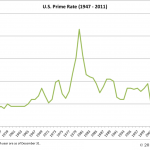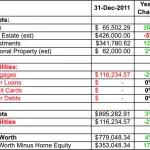Due to advancements in technology, the ever-growing mobile trend, and society's desire for convenience, the face of money management is evolving. In the past, everything was done manually and was centered on brick-and-mortar banking institutions. ...
Continue reading Why the New Face of Money Management Is Making Walk-in Banks Obsolete
A Quick Look at the Hidden Costs of a College Education
Let's face it, folks: for most people, college is a really bad investment. That's why I'm constantly harping on the high cost of college and the importance of ensuring -- before you commit to higher education -- that the degree you're chasing will ...
Continue reading A Quick Look at the Hidden Costs of a College Education
Poll: The 5 Biggest Money Regrets of 2015 — and How to Conquer Them
I'm confident that this time last year, scrawled on your list of New Year resolutions, was a sentence relevant to at least one of these four phrases:
'save money'
'stop spending'
'get out of debt'
'stick to a budget'
According to a ...
Continue reading Poll: The 5 Biggest Money Regrets of 2015 — and How to Conquer Them
Unlike Gen X, the Millennials Think College Is Still Worth It
Millennials may be paying out a lot more for college and racking up record student debt -- but they don't seen to mind, if the latest market research of 500 university graduate students by Credit Sesame is any indication.
Even though the cost of ...
Continue reading Unlike Gen X, the Millennials Think College Is Still Worth It
Infographic: Diagnosing the Causes of Medical Debt in the U.S.
Over the last few years, medical debt has quickly become the number one reason why people file for bankruptcy in the United States. In fact, 1.7 million people will be forced to file bankruptcy because of their medical debt.
Regardless of whether ...
Continue reading Infographic: Diagnosing the Causes of Medical Debt in the U.S.
The Average Owner Credit Score and Loan Payment for 10 Popular Cars
In case you missed it, the other day ZeroHedge published a story on the soaring car repossession rate that included some interesting data from Experian comparing the average credit scores and loan payments for owners of ten popular car models. I ...
Continue reading The Average Owner Credit Score and Loan Payment for 10 Popular Cars
A Fun Interview with Stacking Benjamins’ Host, Joe Saul-Sehy
I recently met with Joe Saul-Sehy to talk about his new money podcast, Stacking Benjamins, which debuts this week. We had just finished recording his final Two Guys and Your Money show, and I figured it would be clever to conduct the interview via ...
Continue reading A Fun Interview with Stacking Benjamins’ Host, Joe Saul-Sehy
Why Bag Ladies are Financially Savvier Than Many Celebrities
Grammy Award winner Dionne Warwick, who found fame in the 1960s singing "Do You Know the Way to San Jose?" filed for bankruptcy yesterday.
Younger folks may recognize Warwick from the 1990s, when she was the celebrity spokesperson for the Psychic ...
Continue reading Why Bag Ladies are Financially Savvier Than Many Celebrities
The Best Credit Cards of 2013
This is a guest post by Logan Abbott. Logan is the editor of MyRatePlan.com, a leading comparison site for credit cards, mobile phones, phone service, insurance, and more.
The New Year is upon us, and that means you probably made some New Year's ...
Continue reading The Best Credit Cards of 2013
100 Words On: A Grim Warning to Those Who Think Money Grows On Trees
A democracy can only exist until the voters discover that they can vote themselves largesse from the public treasury. From that moment on, the majority always votes for the candidates promising the most benefits from the treasury, with the result ...
Continue reading 100 Words On: A Grim Warning to Those Who Think Money Grows On Trees
100 Words On: Saving Your Lame Excuses for Somebody Who Cares
A wise man once said that excuses are tools of incompetence, only useful for building monuments of nothingness and bridges to nowhere. When it comes to personal finance, there are a countless number of excuses that people often use to explain why the ...
Continue reading 100 Words On: Saving Your Lame Excuses for Somebody Who Cares
Southwest Airlines: Website Horror Stories, Part II
You're traveling through another dimension, a dimension not only of sight and sound, but of mind. A journey into a wondrous land whose boundaries are that of imagination. That's the sign post up ahead, your next stop: The Personal Finance Twilight ...
Continue reading Southwest Airlines: Website Horror Stories, Part II
What Goes Around Comes Around: Rising Interest Rates Are Inevitable
Last summer my 12-year-old daughter, Nina, was extolling the fashion virtues of her hot pink Converse Chuck Taylor All-Star high-top sneakers, better known to many as simply, "Chucks."
What I found amusing was while Nina really thought she was on ...
Continue reading What Goes Around Comes Around: Rising Interest Rates Are Inevitable
The Apocalypse Can Wait: My State of the Household Report for 2012
As the old saying goes, knowledge is power.
When it comes to tracking personal finances, one of the most important pieces of information in you can have in your knowledge database is a detailed summary that highlights where your household income ...
Continue reading The Apocalypse Can Wait: My State of the Household Report for 2012
The Latest Credit Card Gimmick: Two Different Cards, One Statement
I have a love/hate relationship with my credit card company. Last week I got a little taste of both after they sent me another mailbox surprise.
You see, although my current Citi Dividends Mastercard didn't expire until 2014, they went ahead and ...
Continue reading The Latest Credit Card Gimmick: Two Different Cards, One Statement
The Scapegoat: GE Money Takes Your Cash and Stores Take the Fall
by Angie Picardo
�If you apply for a [store name] credit card today you can get [arbitrary number]% off your purchase.� I can�t remember the last time I was able to go to a mall without being bombarded with pitches for store credit cards. I always ...
Continue reading The Scapegoat: GE Money Takes Your Cash and Stores Take the Fall
Pick Your Plastic: How to Choose the Right Credit Card
by Joy Paley
Joy Paley is a guest blogger for Pounding the Pavement and a writer on the subject of becoming a nail technician for the Guide to Career Education.
There are lots of good uses for the seemingly dozens of credit card offers most ...
Continue reading Pick Your Plastic: How to Choose the Right Credit Card
If It Feels Good Do It: Maybe Strategic Defaults Aren’t So Bad After All
I bought my first home in 1990 at the top of the Southern California real estate market and promptly found myself with an "underwater" mortgage. And although I owed more than the home was worth over the next seven long years, I never walked away from ...
Continue reading If It Feels Good Do It: Maybe Strategic Defaults Aren’t So Bad After All
The Ugly Truth: Why Big Spenders Are Terrible In Bed
It is a truism that most big spenders are showoffs; they feed off attention.
Ironically, while your typical big spender works 24/7 trying to impress others, most of the time they rarely do so.
There is a small segment of the population, ...
Continue reading The Ugly Truth: Why Big Spenders Are Terrible In Bed
Paying Off the Mortgage Early? Not So Fast …
In January 2009 I wrote one of my most popular posts to-date entitled Paying Off Your Mortgage Early Is A No-Brainer. In that post I did a detailed analysis that justified why paying down my mortgage was the right thing to do.
That Was Then, This ...
Continue reading Paying Off the Mortgage Early? Not So Fast …


















